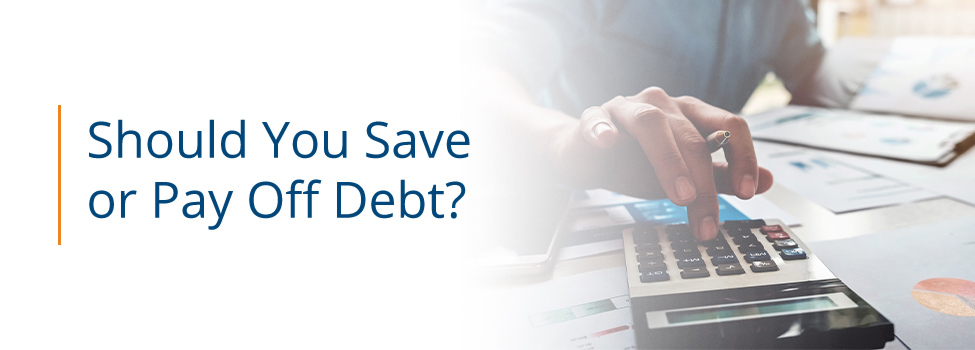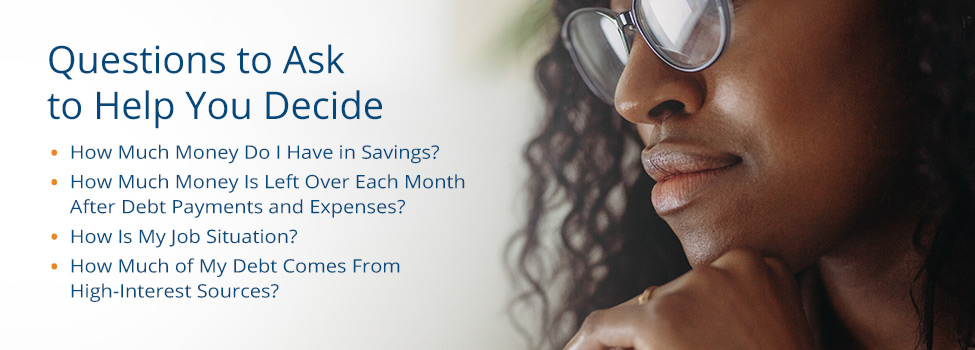Should You Save or Pay Off Debt?

It can be difficult to imagine saving for an emergency on top of monthly debt payments with so much debt looming overhead. It’s easy to see why an emergency fund is essential. So, is it better to keep money in savings or pay off debt first?
The truth is that by balancing savings and debt payments, you’ll save much more money in the long run. Read on to learn the best strategies for managing your debt while also contributing to a savings account.
When Is it Best to Save First?
Emergencies occur when we least expect them, and sometimes at the least convenient time for our finances. The best way to prepare before an emergency occurs is with an emergency fund tucked away in a savings account. Those without an emergency fund usually need to rely on credit to get through the situation, which adds to high-interest debt.
If you have money in a savings account, you might be wondering if you should use those savings to pay off your credit card debt. If using your savings to pay off your credit card would completely drain your savings, keeping the money in your savings account may be better. Your savings will cushion the financial burden in case of an emergency and save you money in the long run.
If your debt accounts have low interest rates, you can safely prioritize an emergency fund over quickly paying off your debt. The interest rates on a mortgage or federal student loan debt are typically low enough that it will take a long time to accrue much interest. Until you have a comfortable emergency fund to fall back on, you should feel empowered to start with minimum payments for these accounts.
Additionally, if your job offers a retirement savings plan such as a 401(k), then you should consider making monthly payments if you have an emergency fund already in place.
When Is it Best to Pay Off Debt First?
Credit cards have notoriously high-interest rates, resulting in drastically increased debt if left unchecked. According to our credit card debt calculator, if you use a credit card with a 25% interest rate to buy a new mattress for $1,000, sticking to the minimum payment would double the amount you pay in the long run. Monthly compounding interest means that the mattress would take seven years to pay off and reach a new total of $2,172. Visit our credit card interest calculator to learn how much interest you might accrue based on your payments.
If you have a large amount of high-interest debt, you should prioritize paying it down as quickly as possible. Because the annual percentage yield (APY) is higher on credit cards than on savings accounts, it’s more cost-effective in the long run to pay debt off instead of saving the money. To illustrate, a $1000 balance in a savings account with a .50% APY — which is generally considered a high-yield savings account — would only add $36 to the total balance over seven years.
While primarily focusing on paying your high-interest debt, it would be beneficial to deposit a small amount of money into your savings account after every paycheck. As little as $20 each month can add up over time, and the accrued funds can put a significant dent in a future emergency expense. The act of regularly depositing in your savings will also help you form the habit of saving money.
What Type of Debt Should You Pay Off First?
Once you’re ready to start chipping away at debt, it’s best to focus on one area at a time. Spreading your payments too thin will result in your high-interest balances compounding the interest again. Follow this priority list to pay off your debt quickly and with the best long-term impact on your finances:
- High-interest credit balances: Prioritize paying off high-interest credit cards because the compound interest can result in a larger balance over time. If you have multiple credit cards with similar APRs, work on paying off one at a time while still making minimum payments to the others. This will allow you to pay off other debts faster.
- Private student loan debt: Private student loans tend to have higher interest rates than federal loans, with average fixed rates around 10% and variable rates around 8%. After you pay off your credit card balances, it will be much easier to pay extra toward your student loans. You may also be eligible to reduce your taxable income by up to $2,500 per year for student loan interest paid during the year.
- Long-term debt: Your remaining debts should consist of low-interest loans stretched over a long period, like mortgage payments and car loans. Starting with the account with the lowest balance, pay as much as you can afford each month while covering all other expenses and making minimum payments on other debt accounts. Once you’ve paid off one account, move on to the next until you pay everything in full.
What Is the Ideal Formula for Saving and Paying Off Debt?
While you should save money and pay down debt simultaneously, you will find the most success in focusing most of your resources on one or the other, depending on your financial situation. Generally, if you have debt accounts with an APY over 10%, you should focus primarily on paying off those debts while contributing a smaller amount to your savings account per month.
Once you have paid the accounts with the largest APYs, focus on building your emergency fund until you have enough to cover at least six to nine months of expenses. After you’ve established a security fund, you can focus on paying off the rest of your debt.

Questions to Ask to Help You Decide
How Much Money Do I Have in Savings?
Focus your efforts on debt repayment if you already have enough money in your savings account to cover a few months of expenses. In the event of an emergency, your savings will help cover the sudden expense. If you’re starting a new savings account, you should contribute as much as you can each month after paying high-interest debts.
How Much Money Is Left Over Each Month After Debt Payments and Expenses?
If you find that you’re running low on cash at the end of the month after paying for all necessary expenses, it would be wise to prioritize paying off your debts. The sooner you clear a line of credit, the sooner you’ll be able to free up extra money each month.
How Is My Job Situation?
Your job security can play a large factor in paying off debts. If your job feels unstable, prioritize saving money in an emergency fund. If you have to leave your job suddenly, your emergency fund will help pay for your expenses while searching for a new job.
How Much of My Debt Comes From High-Interest Sources?
If most of your debt comes from credit cards, try to pay them off as soon as possible to reduce the interest accrued over time. If most of your debt comes from low-interest sources like federal student loans, focus on building an emergency fund until you have enough to cover a few months’ expenses.
Saving or Paying Off Debt: A Combination Is Best
Effectively managing your finances often feels like a balancing act. If you have questions or need financial advice, check out our blog today for more tips and other helpful tools!
Share:
Disclosures
The material on this site was created for educational purposes. It is not intended to be and should not be treated as legal, tax, investment, accounting, or other professional advice.
Securities and Insurance Products:
NOT A DEPOSIT | NOT FDIC INSURED | NOT BANK GUARANTEED | NOT INSURED BY ANY FEDERAL GOVERNMENT AGENCY | MAY LOSE VALUE

